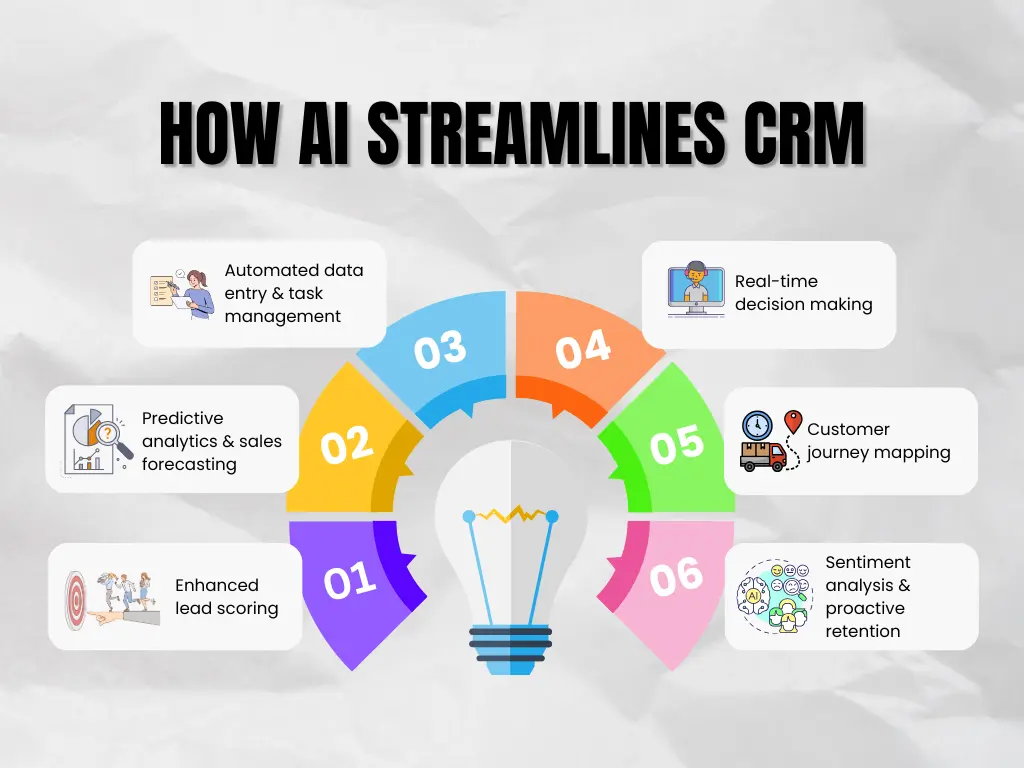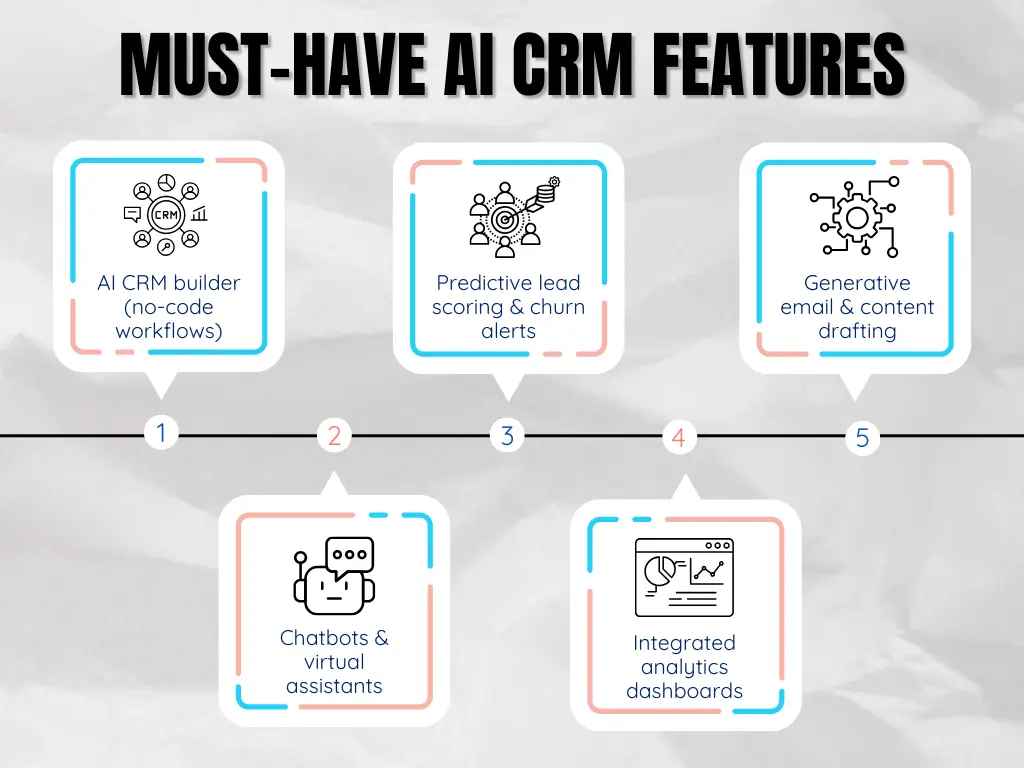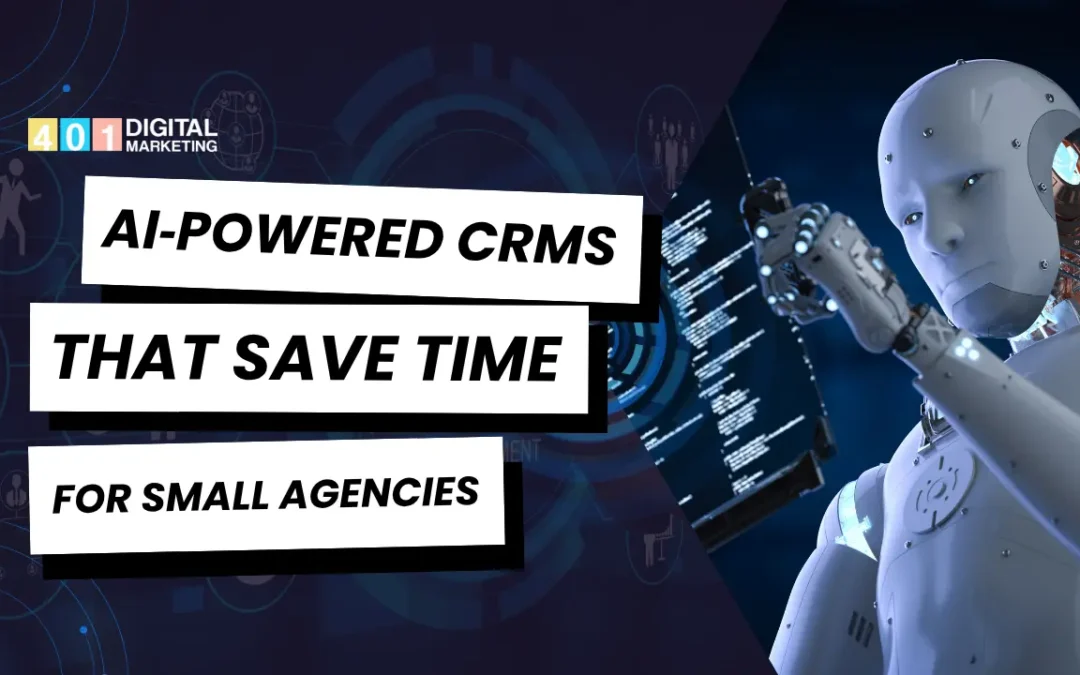Why AI CRM Tools Are the Future for Canadian Agencies
In 2026, AI is no longer optional, it’s essential. According to Statista, the global AI market is projected to hit $243 billion this year and 46% of businesses report increased revenue thanks to adopting AI CRM tools.
Canadian agencies, especially small businesses in digital marketing, e‑commerce, SaaS and retail need smarter, faster and more adaptive solutions. That’s where ai based crm and crm software for small business come into play, bringing automation, predictive intelligence and personalization into your everyday workflow.
What Is AI CRM?
CRM Meaning
Customer Relationship Management (CRM) refers to tools that help businesses manage leads, contacts, pipelines, marketing and support. It acts as your digital command center for all client activities.
What Is AI-Based CRM?
AI CRM (Artificial Intelligence CRM) integrates machine learning, NLP and automation into traditional CRM systems. This allows you to:
- Predict customer behavior
- Automate routine follow-ups
- Personalize communication at scale
- Provide insights in real-time
Whether you’re a solo marketer or running a full-scale Canadian digital agency, AI-powered CRMs can supercharge productivity and improve campaign ROI.
Why Small Businesses Need CRM Software
Here’s why agencies across Canada from Toronto to Vancouver are investing in CRM systems for small businesses:
Key Benefits of a CRM Tool:
- Centralized Client Data for better collaboration
- Workflow Automation (emails, task reminders, lead nurturing)
- Smart Analytics & Dashboards that help make data-driven decisions
- Real-Time Personalization based on behavioral data
How CRM Systems for Small Businesses Drive Growth
- Better client retention and upsell opportunities
- Streamlined workflows for teams with limited resources
- Increased revenue per client thanks to cross‑sell analytics
- Reduced time spent managing spreadsheets and calendars
Generative AI CRM Examples (Real-World Use Cases)
Case 1: Predictive Lead Scoring
An e‑commerce agency in Toronto uses AI to prioritize leads based on their likelihood to convert. This has helped streamline follow-ups and save over 15 hours per month by focusing only on high-potential prospects.
Case 2: Smart Email Drafts
A SaaS startup based in Vancouver leverages AI to automatically generate and personalize client outreach messages. As a result, they’ve seen a 30% increase in email response rates and reduced time spent on copywriting.
Case 3: Sentiment Analysis
A retail business in Mississauga utilizes AI to monitor customer reviews, chats and direct messages. This allows the team to proactively address negative feedback before it affects satisfaction or retention.
These use cases highlight how AI CRM tools provide practical advantages—saving time, improving engagement, and enhancing decision-making for small businesses across Canada.
How AI CRM Tools Save Time
Let’s face it—manual tasks, scattered data and disjointed communication eat into your team’s time. That’s where AI-powered CRM tools step in, automating routine actions and guiding smarter decisions, so your team can focus on strategy instead of admin.
Here’s how AI does the heavy lifting:
1. Task Automation & Smart Scheduling
AI automates daily tasks that once took hours, such as:
- Sending timely follow-up emails
- Advancing deals through your sales pipeline
- Setting intelligent reminders and tagging leads automatically
- Assigning leads to the right team member based on availability or expertise
This reduces human error and ensures no opportunity falls through the cracks.
2. Predictive Analytics & Lead Intelligence
AI doesn’t just crunch numbers it anticipates outcomes. With predictive modeling, you can:
- Estimate churn risk and customer lifetime value
- Forecast revenue pipelines with surprising accuracy
- Set proactive alerts for leads or clients needing urgent attention
The result? Faster, data-driven decisions that reduce guesswork.
3. Real-Time Decision Support
While your reps are talking to leads or prospects, AI offers:
- Instant recommendations for what to say or do next
- Real-time scoring based on customer behavior and interactions
This gives sales and support teams a serious edge in staying relevant and responsive.
4. Customer Journey Mapping
AI tracks how each customer interacts with your brand across every stage of their journey, helping you:
- Visualize touchpoints from the first ad click to final purchase
- Identify where leads drop off and apply fixes by channel or content
With these insights, your campaigns get sharper and your conversions get stronger.
AI CRM tools save you hours each week, eliminate guesswork and help your team stay focused on high-impact activities like nurturing relationships, closing deals and scaling strategy.

Features to Look for in CRM with AI Integration
| Feature | Why It Matters |
|---|---|
| AI CRM Builder | Lets you design smart workflows without coding |
| Automated Data Entry | Syncs emails, calls and chats to CRM fields |
| Lead Scoring | Automatically ranks prospects for faster follow-up |
| Customer Personalization | Tailors messages based on behavioral signals |
| Analytics Dashboard | Delivers insights and suggestions in real-time |
For the best crm for small companies, prioritize tools offering scalable AI modules and localized support in Canada.

Cost Breakdown: How Much Does CRM Software Cost in Canada?
| Tier | Price Range (CAD/user/month) | Includes |
|---|---|---|
| Free | $0 | Basic CRM features, no AI |
| Entry-level | $40–60 | AI-enabled tools, integrations |
| Professional | $100–150+ | Full automation suite, advanced analytics |
Start small. You can always upgrade as your team grows.
Challenges of Integrating AI in CRM (and How to Solve Them)
| Challenge | Solution |
|---|---|
| 1. Data Quality | Run a cleanup before migration; use enrichment tools |
| 2. Integration Complexity | Start with plug-and-play CRMs |
| 3. Cost Concerns | Begin with affordable AI CRM tools or use freemium models |
Understanding these early can make your CRM adoption smooth and cost-effective.
Choosing the Best CRM for Small Companies
Selecting the right CRM isn’t just about flashy features, it’s about finding a solution that fits your unique business needs, budget and growth plans. Whether you’re a startup, a small agency or an expanding retail brand, choosing wisely can save you time, streamline operations and improve customer relationships.
Here are key factors to consider when evaluating CRM packages for small companies:
- Number of Users and Clients
Choose a CRM that scales with your team size and customer base without inflating costs as you grow. - Types of Campaigns You’ll Run
Whether you’re focused on sales automation, digital advertising, customer support or all three, your CRM should align with your day-to-day campaign workflow. - Email Marketing & Chatbot Integration
Look for systems that offer built-in tools or seamless integrations for email automation, newsletters and conversational AI support. - Canadian Data Compliance (PIPEDA)
Ensure the CRM complies with Canada’s privacy regulations to protect your customer data and avoid penalties. - Mobile Access & Remote Work Support
Especially important for distributed teams, a cloud-based CRM with mobile functionality ensures your staff can work efficiently on the go.
Local Tip:
If your business operates in Quebec or serves French-speaking clients nationwide, make sure your CRM supports bilingual communication (English/French) to deliver inclusive and professional service.
Conclusion: Build Smarter Relationships with AI-Based CRM
AI CRM is not just for tech giants, it’s for any Canadian small business that wants to scale smarter. With tools that automate, analyze and personalize, you can deliver top-tier customer experiences while freeing your team from tedious tasks.
At Digital Marketing 401, we help you implement the best CRM tools for small businesses so you can focus on what you do best: building relationships, growing revenue and delivering standout campaigns.
Ready to streamline your marketing agency? Let’s set up your AI-powered CRM today.
Frequently Asked Questions (FAQs)
What is a CRM system in marketing?
A CRM system in marketing is a tool that helps businesses track leads, manage customer data, run automated campaigns and build long-term customer loyalty through personalized, data-driven actions.
What does CRM stand for?
CRM stands for Customer Relationship Management. It refers to software platforms that help businesses manage their relationships with current and potential customers more effectively.
Is there an AI-powered CRM?
Yes, many modern CRM systems now include built-in AI features like lead scoring, smart email generation, chatbots and predictive analytics. These AI-powered CRMs help automate repetitive tasks and deliver real-time insights.
Can AI CRM tools help with sales forecasting?
Absolutely. AI CRM tools use predictive analytics to forecast future sales, customer behavior and churn risk based on historical data, helping teams make smarter business decisions.
Are AI CRM tools suitable for startups?
Yes, AI CRM tools are ideal for startups. Many platforms offer affordable, scalable plans with flexible features like automation, email generation and lead tracking that grow with your business.
What are three commonly used examples of AI in CRM?
Three widely used examples of AI in CRM are:
- Predictive lead scoring
- Smart email and content generation
- Sentiment analysis of customer feedback
Recent Blogs
AI in Digital Marketing: Tools Every Marketer Should Know in 2026
Digital marketing is changing fast. In 2026, the biggest shift is how AI-powered digital marketing tools help businesses work smarter instead of harder. From planning campaigns to tracking leads, AI in digital marketing now plays a major role in how marketers get real...
Furniture Store Digital Marketing in Mississauga: How to Get More Walk-Ins
Furniture store digital marketing helps Mississauga furniture stores get more walk-ins by improving Google Maps visibility, local search rankings and direction-based ads. When done correctly, it turns online searches into real showroom visits from nearby buyers who...
Why Your Used Car Dealership Is Not Getting Leads From Google
If your car dealership is not getting leads from Google, you are not alone. Many Mississauga dealers ask the same question: why is my used car dealership not getting leads from Google, even when my business shows up in search results? In reality, many used car...




